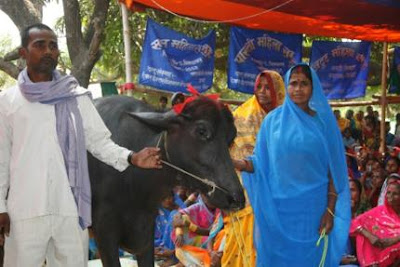
The true face of poverty stares you in the face in Rautahat. In the eastern plains of Nepal, dire need and scarcity is plentiful. Scattered along what can be defined as roads, are huts. Made of mud plastered in dried bamboos and sticks, the walls shelter humans and animals alike. There is no differentiation. Thin, sparsely clothed children run about on a weekday. There is obviously no school for them. The flat lands extend out as far as the eye can see. It’s almost time to plant rice, so every plot has a thin man in a wrap-around following a set of bullock, the most used draft animals. Tractors are rare here, too expensive to hire, let alone buy. They wait for the rain.
Under the mango trees, the heat is bearable. It’s why they have chosen this place for a Passing on the Gift ceremony. Near the shade are two sheds, local schools someone points out. Many here can’t afford to send their children there. The air is festive with the sound of local indigenous instruments. It sounds like a wedding. The buffalos and the goats chew away at the grass on the ground. They seem less impressed with the facade.
The women are seated on the floor. Rows of vibrant colored sari against smooth dark skin, the contrast is amazingly beautiful. One end of the sari goes around the head. Tradition demands that all women of age cover their heads. It connotes respect for the elders and the essence of being a woman. Perched around are men and children of all ages witnessing an event so rare in their community. A cluster of older men are seated on chairs. It’s clear that these are the more respected ones.
Pachiya Devi Shah also sits with the men, a strange sight in Rautahat. For women here have boundaries; invisible lines that they dare not cross. Speaking to strangers, removing their head cover and sitting with men are definitely on the other side of that line. But Pachiya Devi sits and chats confidently. It is clear that she is accepted, respected almost. As Heifer’s Golden Talent Award winner, she won more than the $1000 prize money. Being able to help provide for her family has won the respect of her family and the community. She won acceptance on the other side of the line, making it a bit faint for others who follow her.
Sarala Yadav, a member of Parliament elected from this constituency, presides as the chief guest. “As a woman, I understand the challenges that women face. Their struggles are far harder than mine. This project, I feel has been especially successful in helping the women overcome these sensitive challenges,” she says.
Seventeen buffalo and 43 goats were passed on from Saraswoti and Shiv Shakti Women Group to Jana Shakti and Nari Shakti Women Group. Vegetables and fodder seeds exchanged hands along with advice and assurance. As the timid recipients’ lead their animals away, the crowd moves toward the school. A feast was being prepared. Men and boys kneaded the dough and flattened the rotis. Another group fried them in huge quantities of oil upon a wood fire. Everyone sat down on the cramped junior school desk and the feast began.
The servings were plentiful. So were the hopes and dreams as another generation of gifts and training enriched the lives of more families. Soon there will be milk and meat in more homes and more children will go to this school.
Puja Singh is a Heifer communication officer based in Kathmandu, Nepal.